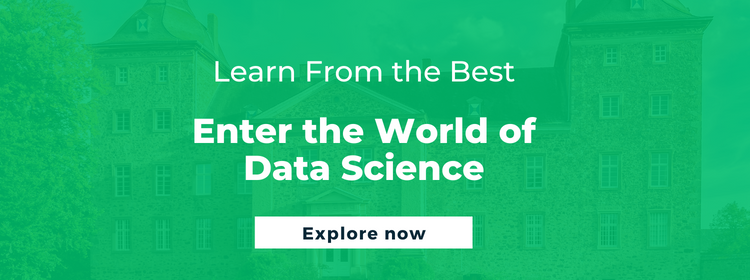What is Applied Data Science? How Does it Harness Insights for Innovation

- What is Applied Data Science?
- How is Applied Data Science Different From Data Science?
- What is the Role of Applied Data Science in the Business World?
- What are the Skills Required for a Successful Career in Applied Data Science?
- What Tools and Techniques are Essential for Data Analysis in Applied Data Science?
- What Job Opportunities are Available in the Field of Applied Data Science?
- What is the Average Salary for an Applied Data Scientist
- What are Some Trends in the Field of Applied Data Science?
- Learn More About Applied Data Science with Emeritus
Applied data analytics has become an essential component of modern business. Its value to organizations can be attributed to the exponential growth of data and the need to derive actionable insights for informed decision-making. Companies also recognize its importance in optimizing operations, understanding customer behavior, and driving innovation. As a result, professionals with expertise in applied data science are in high demand. Statistically, the global big data and analytics market is expected to reach $650 billion by 2029, indicating significant growth opportunities for skilled professionals. However, to make the most of this high-demand profession, they must enhance their skills to advance in this field.
The following blog discusses what applied data science is, how it differs from traditional data science, and why it is gaining momentum.
What is Applied Data Science?
Applied data science uses data analysis tools and techniques to solve real-world problems and make data-driven decisions. Furthermore, it also involves extracting, cleaning, and analyzing data to gain insights and inform decision-making. Given its vast potential, applied data science is essential to diverse industries such as healthcare, finance, marketing, and more.
How is Applied Data Science Different From Data Science?
 Applied data science and data science are closely related but have distinct differences in focus and scope. Hence, here’s an explanation of how they differ.
Applied data science and data science are closely related but have distinct differences in focus and scope. Hence, here’s an explanation of how they differ.
Focus
Data science has a broader focus and encompasses the entire data analysis and modeling process, including data exploration, cleaning, and algorithm development. Applied data science narrows the focus to applying data science techniques to solve specific problems in a particular domain or industry.
Practical Application
Data science often involves research-oriented activities, where the goal is to advance the field and also develop new algorithms or methodologies. Applied data science, however, is more concerned with practical application and using existing data science techniques to solve real-world problems and deliver tangible outcomes.
Domain Expertise
Applied data scientists often have a deeper understanding of their specific domain or industry. Furthermore, unlike traditional data scientists, they combine their data science skills with subject-matter expertise. This allows them to develop effective solutions tailored to the unique challenges of that domain.
Implementation and Deployment
Applied data science focuses on implementing and deploying data-driven solutions in a production environment. It also involves integrating data science models and insights into existing systems or workflows to drive decision-making and generate business value.
What is the Role of Applied Data Science in the Business World?
Applied data science is crucial in business by leveraging data-driven insights to drive decision-making and achieve a competitive advantage. Here are some key roles of applied data science in business:
Decision-Making
Applied data science helps businesses make informed as well as evidence-based decisions. Businesses can also gain insights into customer behavior, market trends, and operational patterns by analyzing and interpreting large volumes of data.
Predictive Analytics
Businesses can seek help from data science to make predictions and forecasts based on historical data. Such organizations can anticipate customer behavior, demand patterns, and market trends by developing predictive models.
Customer Insights
Applied data science also helps businesses understand their customers better. For instance, businesses can analyze customer data and identify patterns, preferences, and segments for better sales and revenue.
Risk Management
Businesses can analyze historical data to detect patterns that indicate fraudulent activities, credit default risks, or cybersecurity threats. They can use applied data science by leveraging predictive models and anomaly detection techniques.
What are the Skills Required for a Successful Career in Applied Data Science?
A successful career in applied data science requires combining technical skills, domain expertise, and soft skills. Let’s now look at some key skills typically sought in the field.
- Strong statistical as well as mathematical background with proficiency in probability theory, hypothesis testing, regression analysis, as well as other statistical techniques
- Programming skills with proficiency in programming languages commonly used in data science, such as Python or R
- Data visualization, manipulation, and analysis skills, including data preprocessing, cleaning, and transformation abilities
- A solid understanding of machine learning techniques as well as algorithms and practical experience in building and fine-tuning machine learning models
- Finally, domain expertise in the industry or domain of application to formulate questions and also identify variables
What Tools and Techniques are Essential for Data Analysis in Applied Data Science?
Applied data science involves the use of various essential tools as well as techniques for better data analysis, modeling, and decision-making. Some of them are mentioned below:
- Programming languages such as Python and R for extensive support for data manipulation, statistical analysis, and machine learning
- Data manipulation and analysis tools like Pandas in Python and dplyr in R are essential for data manipulation tasks such as filtering, merging, grouping, as well as transforming data
- Statistical analysis libraries like SciPy in Python and the stats package in R to perform statistical tests, estimate parameters, as well as analyze relationships between variables
- Machine learning algorithms for predictive modeling and classification of data
- Data mining and text analytics techniques, such as data mining and text analytics to extract insights from large and unstructured data sets
- Lastly, big data analytics tools like Apache Hadoop and Apache Spark for distributed processing and analysis of big data
What Job Opportunities are Available in the Field of Applied Data Science?
Applied data science also offers various job opportunities across multiple industries. Here are some common job roles in applied data science.
Applied Data Scientist
Applied data scientists analyze complex data sets, develop statistical models and apply machine learning techniques. They also aim to extract insights and solve business problems through model building and evaluation.
Data Analyst
Data analysts collect, clean, and analyze data to identify trends, patterns, and insights. Moreover, they perform exploratory data analysis, create visualizations, and generate reports to support decision-making processes.
Machine Learning Engineer
Machine learning engineers develop and deploy machine learning models in production environments. Furthermore, they are responsible for building scalable and efficient algorithms, optimizing model performance, and integrating models into software systems.
Data Engineer
Data engineers build and maintain the data storage, retrieval, and processing infrastructure. In addition, they also develop and optimize data pipelines, implement data integration solutions, and ensure data quality and reliability.
What is the Average Salary for an Applied Data Scientist
An applied data scientist earns an average salary of $127,044 annually in the U.S. as of May 2023. Furthermore, the base pay is around $104,029 per year.
ALSO READ: How to Become a Data Scientist
What are Some Trends in the Field of Applied Data Science?
The field of applied data science is dynamic and constantly evolving. We take a look at some current trends that are shaping the field.
Explainable AI
Artificial Intelligence (AI) and Machine Learning (ML) models are becoming increasingly complex. This means there is a greater need for interpretability and transparency. Explainable AI aims to develop techniques to explain the predictions and decisions made by AI models.
Auto ML and Automated Data Science
 AutoML (Automated Machine Learning) and automated data science tools are gaining popularity because they automate various stages of the data science workflow. This includes data preprocessing, feature engineering, model selection, and hyperparameter tuning.
AutoML (Automated Machine Learning) and automated data science tools are gaining popularity because they automate various stages of the data science workflow. This includes data preprocessing, feature engineering, model selection, and hyperparameter tuning.
Edge Computing and IoT Analytics
The proliferation of Internet of Things (IoT) devices and the need for real-time applied data science analytics are driving the adoption of edge computing. This involves processing data on local devices or edge servers closer to the data source rather than sending it to the cloud.
Augmented Analytics
Augmented analytics combines machine learning and natural language processing with traditional analytics tools. Besides, it automates data preparation, analysis, and visualization.
Learn More About Applied Data Science with Emeritus
Applied data science is essential for businesses because it enables them to uncover valuable insights that help decision-making. That is why companies actively seek professionals well-versed in this field. It is, therefore, essential to stay updated and skill up. A good way to do so is by signing up for Emeritus’ data science courses because they provide comprehensive knowledge and practical skills needed to thrive in this dynamic space. These courses equip professionals with industry-relevant knowledge, hands-on project experience, and guidance from experienced instructors.
Write to us at contact@emeritus.org






